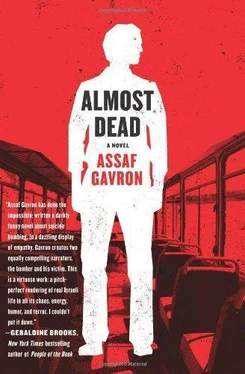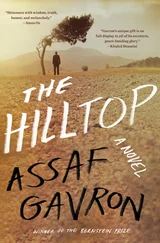‘We did something big this week.’
‘Remember the village of Silwad. Wadi Haramiya. The guy found a spot on the ridge with a Karabin and took out ten soldiers one after the other, and got away without being caught. The road to Jerusalem — it’s the busiest road. It’s a symbol. It will shock them. They’ll think they’re back in ’48. And the conditions there…it’s no coincidence that my grandfather sniped at convoys from there. The wadi there’s just like the one in Silwad.’
‘It’s not Silwad,’ said Abu-Zeid. ‘In Silwad there’s a village. Fifteen minutes later the sniper was in safe hands.’
Abu-Zeid took the drawing and touched it to the bare orange spirals of the heater. He stood up with the burning page in his hand, opened a window, looked out into the rain, and threw it out. He closed the window and sat back down in his plastic chair, rubbing the ash from his hands.
‘There are problems with this plan. It takes too much time. And the evacuation plan isn’t good. Again, there’ll be no time. In five minutes the area will be full of roadblocks and helicopters. It’s not ’48 any more.’
Bilahl looked at him quizzically. ‘Is there another way?’
Halil Abu-Zeid said, ‘Who will do it?’
‘ Svetlana. How is he? ’
What…? What now?
‘ Normal. A little irritated this morning. ’
‘ You checked his pupils today? ’
Oh no.
‘ Not yet, Dr Hartom .’
‘ Let’s have a look… ’
Yaagghh!! Fuck you! You’re killing me with that torch…!
‘ Hmmm…fine. Did we have a bowel movement? How’s the urine? ’
‘ No B.M. Urine’s in order .’
Go to hell, Hartom, I was in the middle of…oh, where was I?
If this is a dream, then it’s never-ending and never-changing…If this is a dream then it’s a dream of hell.
‘ OK, Fahmi, no reason to be distressed, Svetlana here’s taking good care of you. In the afternoon we’re going to do an MRI and show you some familiar images and play familiar sounds — test your reactions to stimuli. Svetlana, we have the photographs? Music? ’
‘ Yes, Dr Hartom. Everything’s ready .’
Children were playing football in the rain. They shouted and kicked the ball against a wall covered in slogans and posters. Bilahl would send the kids out at night…There was a new poster up, of the shahid Shafiq. Shafiq the martyr with the Temple Mount in the background, and puddles, and mud from the dust that the tanks and bulldozers made the last time they were here, and other children playing marbles under a thatch. The rain didn’t let up. You could hear the sound of applause coming from TVs in the houses along the way. The wind was trying to blow the sheets of corrugated tin off the roofs, rattling the breeze blocks that held them down. My phone was ringing. Grandfather Fahmi lived in a tent for eight years before he built a house out of scavenged concrete, rocks and tin.
‘So you think you’re happy now, eh?’
‘Father?’
‘What will they accomplish, these virtuoso operations of yours?’
‘What operations?’
‘I’m not a fool, Fahmi.’
‘Don’t forget what Grandfather did in ’48,’ I said. ‘He scared them, he didn’t give up, and he brought pride to our people.’
‘Yes. And where exactly did it bring us? To Al-Amari?’
I didn’t answer. I watched the kids in the rain: children born here.
‘Don’t ignore me. Fahmi. You promised me something. Don’t forget. You promised me you would not get into trouble. You promised your father. Fahmi. You gave your word of honour to me.’
In 1935, two weeks after British police had violently broken up Arab protests in Jerusalem, Izz ad-Din al-Qassam gathered his people and announced a jihad. He told them to prepare to leave that same evening, said goodbye to his wife and children and went with his followers to the mountains around Jenin.
Every one of his men carried a small Koran in his pocket. During the days, they studied the Koran. At night they were soldiers. One of those nights, a guard named Mahmoud Salam al-Mahmuzi ran into a Jewish patrol. He shot the commander of the patrol and killed him. Another policeman in the patrol ran to report the incident and, having done so, he ran home, to his wife.
The British retaliated fiercely. A large force was mobilised from all round Palestine and sent to Haifa. The next day five hundred British soldiers set out to catch Izz ad-Din al-Qassam. After a bloody battle which lasted all night, Sheikh al-Qassam was killed and became one of the first of the great martyrs, the shuhada , in the long struggle. He planted the seeds of revolution against Zionism and imperialism and inspired a generation to follow him.
The policeman who ran to report the incident was Duchi’s grandfather. Her mother was born nine months later. My father was born in the same year, 1935, in Maryland, USA.
I took a Little No. 5 home. As far as I was concerned, the cooling-off period was over after one morning. The journey was quieter than usual; the drivers swore less over the radio and committed fewer traffic violations. Even the Jumbos seemed to drive with respect for the sorrow of the minibus drivers.
‘How did you get home?’ asked Duchi.
‘Taxi,’ I said offhandedly.
‘Liar,’ she said.
‘Liar? What reason do I have to lie?’ I said, and really, what reason did I have?
‘Honestly in a taxi?’ She came and gave me a kiss. I opened the refrigerator, looking for something quick. No, not really in a taxi, Duchi, in a Little No. 5. But do you think I’m going to tell you the truth? You think I fancy an argument now?
‘Word of honour.’
Nothing is as it was before September 11th. Everything changed that day, and yet, life went on. The summary: Duchi and I live together for four years, we decide to get married, the date we set is 11 September 2001. Duchi’s mother gets a heart attack and snuffs it a day before the wedding, the wedding is cancelled, and since then this word—‘wedding’—is never heard in our vicinity. It’s as if there are blockades and checkpoints that this word can’t penetrate, as if there’s a lock-and-siege on it. As if they’d sent a whole army to hunt it down and it had vanished and holed up in some abysmal cave, not even bothering to send us a ‘what’s up’ from time to time. It seems that we’re treating the whole thing as if it were a sign from God — or worse, from Duchi’s mother — that we shouldn’t have decided to marry. She sacrificed her life on the altar of this message. The medium was her message. I guess that’s the reason we don’t talk about it. I’m only guessing, though, because we haven’t talked about it. She keeled over and it was as if a valve holding back an immense pressure had blown and all the attention leaked away from the wedding to the funeral. And it’s not as if any of that other stuff helped.
Duchi’s first reaction was to laugh. ‘No way,’ she told the phone. ‘Come on, Dad, you’re putting me on.’ And then she said, ‘OK…OK…OK,’ and hung up and said, ‘My mother died of a heart attack,’ and only then did her eyes well up with tears.
Duchi’s younger brother, Voovi, didn’t look too broken up about it. Her dad certainly wasn’t sorry. Before all of this happened Duchi once made me swear that whatever occurred between us — even if it didn’t work out eventually — we would never end up with the hate-hate relationship her parents had.
Duchi’s father is called Noam Neeman. That’s ‘Pleasant Loyal’ in Hebrew, by the way: two gags for the price of one. He left Duchi’s mother after two kids and six years of marriage and went to Nicaragua with his second wife, whom he dumped after a few more years, kids and arms deals. He returned to Israel at the age of forty-six and married a girl half his age. Duchi was three years younger than her when they got married. She and her brother didn’t make it to the wedding. But I like Noam Neeman. A man with balls. Does what he feels like doing. Half the time he succeeds, half the time he tanks completely. Recently, for instance, he failed miserably with a start-up in which he invested a million dollars. He asked me, ‘If you had a million bucks in the bank, what sort of investment would you put it in?’ I said, ‘I’d put it in the bank.’ His seen-it-all eyes looked me over with bottomless disdain and he drew on his cigar till it crackled.
Читать дальше












